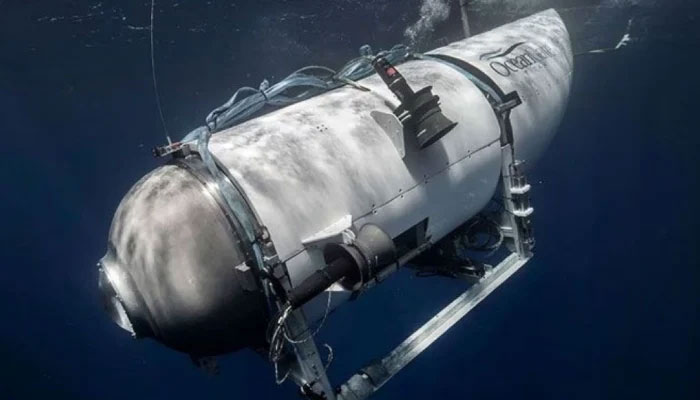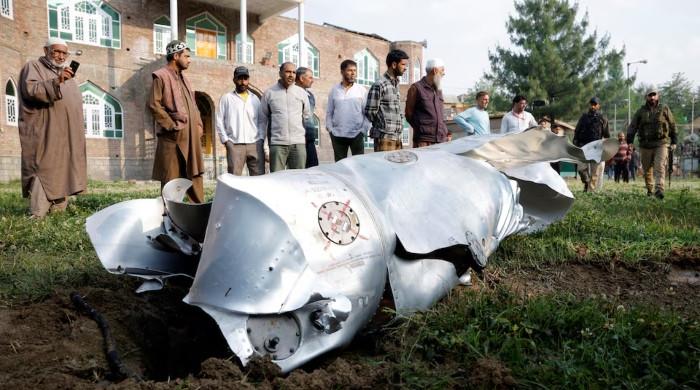Catastrophic implosion: Doctor reveals disturbing final moments of Titan crew
"It would've been so sudden, that they wouldn't even have known that there was a problem, or what happened to them," says Dr Molé
June 23, 2023

The crew of the Titan Five submersible would have died in just milliseconds, revealed a former high-ranking US Navy doctor on Friday, who drew a disturbing picture of the final moments of those aboard.
The sub — whose debris was found 1,600 feet from the bow of the Titanic shipwreck — crushed the passengers inside, who may never have imagined dying this way.
Five major pieces of the crumpled submersible were spotted by a deep-sea robot nearly two miles beneath the sea surface on Thursday.
The discovery of the debris suggests that the submersible likely suffered a catastrophic implosion during its descent to the Titanic shipwreck on Sunday.
According to Daily Mail, Dr Dale Molé, the former director of undersea medicine and radiation health for the US Navy, shared what the crew of Titan may have experienced in their tragic final moments.
Molé told the Daily Mail: "It would have been so sudden, that they wouldn't even have known that there was a problem, or what happened to them.
"It's like being here one minute, and then the switch is turned off. You're alive one millisecond, and the next millisecond you're dead."
Dr Molé likened the seismic implosion to the bursting of a balloon when it has been blown up too much.
"They would have been ripped to shreds," Dr Molé explained.
"An implosion is when the wave of pressure is inward, whereas an explosion is when the pressure wave or the shock wave goes out from whatever the source of that is.
"When somebody stands on an empty soda can, it would support your weight, but then if you press on the sides, the can would collapse immediately."
Submersibles are designed to withstand crushing underwater pressures, such as those 12,500 feet below the surface where the pressure is about 400 times greater than at sea level.
"The pressure hull is the chamber where the occupants reside," Molé explained.
"It sounds as though they had reached the bottom when the pressure vessel imploded, and usually, when it gives way, it gives way all at once."
However, any damage or defect to the Titan's hull could result in a leak, which would trigger the vessel to immediately implode under those extreme pressures.
The Sun quoted Dr Nicolai Roterman as saying that the crew would have died in a "near instant".
Roterman, who is a deep-sea ecologist at the University of Portsmouth, said: "If there was any kind of hull breach, the occupants would succumb to the ocean in a near instant."
The loss of the Titan submersible and its crew is a tragedy and a reminder of the dangers of deep-sea exploration.
Stefan Williams, a professor of marine robotics at the University of Sydney, explained that if the pressure vessel fails catastrophically, it's like a small bomb going off, and all the safety devices might be destroyed in the process.
Since the submersible lost contact with the surface on Sunday, rescue efforts have been ongoing to locate the five passengers on board. However, the discovery of the debris and the likely implosion suggests that the passengers probably did not suffer for long.
According to Guillermo Söhnlein, one of the founders of OceanGate, "If that's what happened, that's what would have happened four days ago." The implosion would have been almost instantaneous, lasting only milliseconds, according to the Journal of Physics: Conference Series.
A similar event happened in 1961 to the USS Thresher, a submarine thought to have imploded.
The Naval History Magazine described that the catastrophic event would have pulled the metal vessel apart "like taffy." The complete destruction would occur in 1/20th of a second, too fast for the men within the submarine to cognitively recognize.
An implosion is the opposite of an explosion, where pressure from outside is rushing in, similar to an explosion, leaving little of the vessel and its cargo.
Journalist David Pogue told CNN, "I know it's no great comfort to the families and the spouses, but they did die instantaneously. They were not even aware that anything was wrong."









